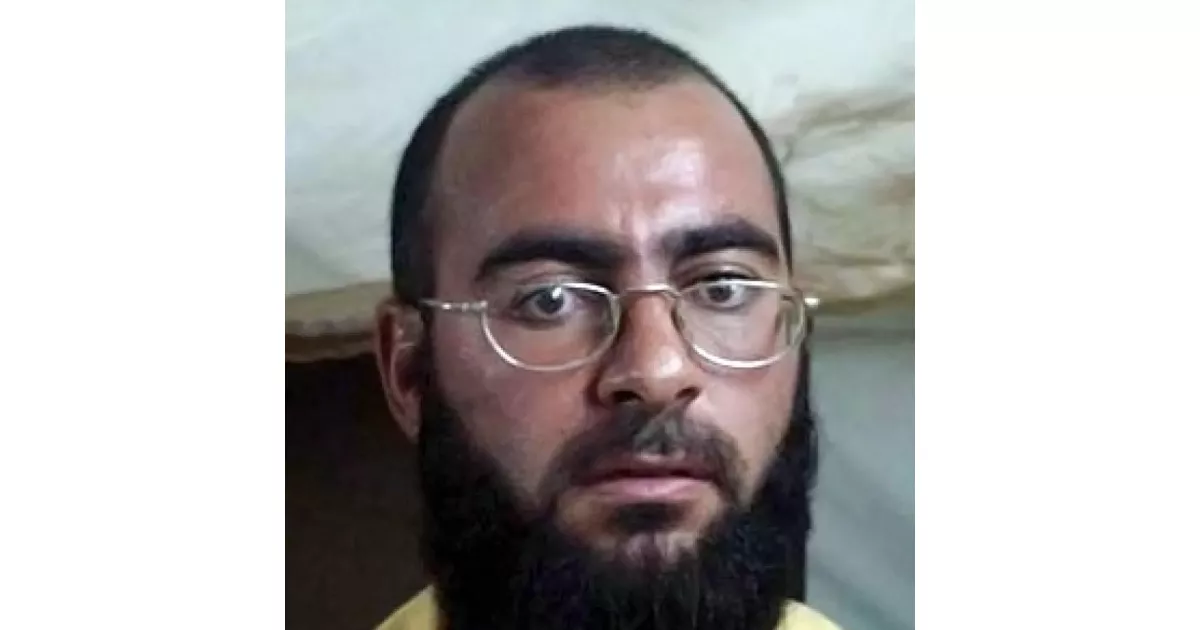Abu Bakr al-Baghdadi, born Ibrahim Awad Ibrahim Ali al-Badri, was the leader of the Islamic State (IS) from 2014 until his death in 2019. Al-Baghdadi was an Iraqi militant who declared himself caliph in 2014 after IS captured large swathes of territory in Iraq and Syria. Under his leadership, IS gained notoriety for its brutal tactics, including mass executions, beheadings, and sexual slavery. The group also claimed responsibility for numerous terrorist attacks worldwide. Al-Baghdadi was killed during a U.S. military raid in Syria in October 2019.
July 1971: Birth of al-Baghdadi
Al-Baghdadi was born on July 28, 1971, in Samarra.
1991: Al-Baghdadi retakes high school certificate
Al-Baghdadi retook his high school certificate in 1991 and was deemed unfit for military service.
2000: Al-Baghdadi's Marriage and Son
Around 2000, after completing his doctorate, al-Baghdadi married in Iraq and had a son who would be 11 years old in 2014.
March 2003: al-Baghdadi leads Jama'at Jaysh Ahl al-Sunna wal-Jama'ah
Following the American invasion of Iraq in March 2003, Baghdadi led the "Jama'at Jaysh Ahl al-Sunna wal-Jama'ah" insurgent group.
2003: al-Baghdadi co-founds Jamaat Jaysh Ahl al-Sunnah wa-l-Jamaah
After the US invasion of Iraq in 2003, al-Baghdadi co-founded the militant group Jamaat Jaysh Ahl al-Sunnah wa-l-Jamaah (JJASJ).
2003: al-Baghdadi's radicalization
Al-Baghdadi may have been radicalized during his youth and internment at Camp Bucca. He may have been a mosque cleric around the time of the US-led invasion in 2003.
2003: Description of al-Baghdadi
In 2003, Ahmed al-Dabash, leader of the Islamic Army of Iraq, gave a description of al-Baghdadi.
February 2004: Arrest of al-Baghdadi
Al-Baghdadi was arrested by US forces in February 2004.
December 2004: Release of al-Baghdadi
Al-Baghdadi was released from detention in December 2004.
2004: al-Baghdadi detained at Camp Bucca
Al-Baghdadi was detained at Camp Bucca in 2004.
2004: al-Baghdadi's life in Tobchi
Until 2004, al-Baghdadi lived in Tobchi, a neighborhood in Baghdad.
2005: Conflicting reports on al-Baghdadi's internment
Some reports state al-Baghdadi was interned from 2005 to 2009.
October 2006: al-Baghdadi becomes leading member of ISI
In October 2006, Baghdadi became a leading member of the newly established Islamic State of Iraq.
2006: Al-Baghdadi's Involvement with Mujahideen Shura Council
In 2006, al-Baghdadi and his group, Jamaat Jaysh Ahl al-Sunnah wa-l-Jamaah, joined the Mujahideen Shura Council (MSC). He served on the MSC's sharia committee and later became the general supervisor of the Islamic State of Iraq's (ISI) sharia committee and a member of its senior consultative council after the MSC was renamed ISI in the same year.
2007: al-Baghdadi completes PhD
Al-Baghdadi defended his PhD thesis in 2007.
2008: Hagar Born
Hagar, allegedly al-Baghdadi's daughter, was born in 2008.
2009: Al-Baghdadi and Al-Dulaimi Last Contact
In 2009 Al-Dulaimi stated that this was the last time she spoke to al-Baghdadi.
2009: Conflicting reports on al-Baghdadi's internment end date
Some reports state al-Baghdadi was interned until 2009.
May 2010: Al-Baghdadi Becomes Leader of ISI
In May 2010, after the death of Abu Omar al-Baghdadi, al-Baghdadi was appointed the leader of the Islamic State of Iraq (ISI).
2010: al-Baghdadi appointed emir of ISI
Al-Baghdadi was appointed emir of the Islamic State of Iraq in 2010.
2010: Fallah Ismail Jassem Killed
In 2010, Fallah Ismail Jassem, identified by some sources as al-Dulaimi's first husband and a member of the Rashideen Army, was killed in a battle with the Iraqi Army.
April 2011: ISI Attacks South of Baghdad
Between March and April 2011, the Islamic State of Iraq (ISI), under al-Baghdadi's command, claimed responsibility for 23 attacks in southern Baghdad.
May 2011: Al-Baghdadi's Response to Bin Laden's Death and Attack in Hilla
Following Osama bin Laden's death in May 2011, al-Baghdadi released a statement praising him and threatening retaliation. He also claimed responsibility for an attack in Hilla, Iraq, that killed 24 policemen and wounded 72 others.
August 2011: ISI Attacks in Mosul and Pledge of 100 Attacks
In August 2011, a series of ISI suicide attacks in Mosul resulted in 70 deaths. The group then pledged to carry out 100 attacks across Iraq in retaliation for Bin Laden's death.
August 2011: Umm al-Qura Mosque Bombing
In August 2011, a suicide bombing at the Umm al-Qura Mosque in Baghdad, orchestrated by al-Baghdadi, killed Sunni lawmaker Khalid al-Fahdawi.
December 2011: Coordinated Bombings in Baghdad
On December 22, 2011, a series of coordinated bombings in Baghdad killed at least 63 people and wounded 180. ISI claimed responsibility, stating the targets were security forces and the Mahdi Army.
2011: US Places Bounty on Al-Baghdadi
A $10 million bounty was placed on al-Baghdadi by the U.S. State Department in 2011, which increased to $25 million in 2017.
December 2012: Alleged Capture and Subsequent Denial
In December 2012, Iraqi officials claimed to have captured al-Baghdadi, but this was denied by ISI, who clarified that a sectional commander was apprehended, not al-Baghdadi.
March 2013: ISI becomes ISIL
In March 2013, the group renamed itself as the "Islamic State of Iraq and Levant" (ISIL).
April 2013: Formation of ISIL
In April 2013, al-Baghdadi announced the formation of the Islamic State of Iraq and the Levant (ISIL), merging ISI with Jabhat al-Nusra, despite opposition from al-Nusra's leader and al-Qaeda's emir.
July 2013: Report on al-Baghdadi's education
In July 2013, reports circulated that al-Baghdadi obtained a BA, MA, and PhD in Islamic studies.
September 2013: Ibrahim Dulaimi Killed
In September 2013, Ibrahim Dulaimi, al-Dulaimi's father and an IS emir in Syria, was reportedly killed during an operation against the Syrian Army in Deir Attiyeh.
2013: Sujidah al-Dulaimi Arrested
In late 2013 or early 2014, Sujidah al-Dulaimi was arrested in Syria.
January 2014: ISIL Expels Jabhat al-Nusra from Raqqa and Clashes in Deir ez-Zor
In January 2014, ISIL expelled Jabhat al-Nusra from Raqqa, Syria. Clashes between the two groups in Deir ez-Zor killed hundreds and displaced thousands.
February 2014: Al-Qaeda Disavows ISIL
In February 2014, al-Qaeda officially disavowed any relationship with ISIL.
March 2014: Sujidah al-Dulaimi Released
In March 2014, Sujidah al-Dulaimi, along with her two sons and younger brother, was released from a Syrian jail as part of a prisoner exchange. This involved 150 women being exchanged for 13 nuns captured by al-Qaeda-linked militants.
June 2014: Declaration of a Worldwide Caliphate
In June 2014, ISIL declared a worldwide caliphate and al-Baghdadi was named its caliph, taking the name "Caliph Ibrahim". ISIL was renamed the Islamic State (IS).
June 2014: ISIL becomes IS and declares itself a caliphate
In June 2014, the group re-designated itself as the "Islamic State" and declared itself a caliphate.
July 2014: Launch of Dabiq Magazine
IS launched its online magazine, Dabiq, in July 2014. The title refers to a location with significance in Islamic end-times prophecies.
July 2014: Al-Baghdadi Declares Himself Caliph
In July 2014, a video surfaced of al-Baghdadi declaring himself caliph during a prayer service at the Great Mosque of al-Nuri in Mosul. While Iraqi officials initially dismissed the video, other sources identified the man as al-Baghdadi.
October 2014: Al-Baghdadi Flees Raqqa
In October 2014, after being injured, al-Baghdadi reportedly fled Raqqa to Mosul due to coalition airstrikes.
November 2014: Audio Message Released
In November 2014, IS released an audio message purportedly from al-Baghdadi. In the message, he vowed continued fighting, urged supporters to engage in jihad globally, called for attacks in Saudi Arabia, and declared IS's intention to expand its territory.
November 2014: Unconfirmed Reports of Al-Baghdadi's Death
In November 2014, unconfirmed reports emerged about al-Baghdadi's death or injury in an airstrike in Mosul.
November 2014: Al-Dulaimi Arrested in Lebanon
In late November 2014, al-Dulaimi was arrested and held for questioning by Lebanese authorities, along with two sons and a young daughter, for traveling on false documents.
December 2014: Al-Dulaimi and Kamal Khalaf Formally Arrested
On December 9, 2014, al-Dulaimi and her Palestinian husband, Kamal Khalaf, were formally arrested on charges related to terrorism.
December 2014: Al-Dulaimi's Potential Intelligence Value and Family as Bargaining Chips
As of December 2014, Lebanese authorities considered al-Dulaimi's potential intelligence value and viewed al-Baghdadi's family members as potential bargaining chips in prisoner exchanges.
2014: Hagar Detained
In 2014, Hagar, allegedly al-Baghdadi's daughter, was detained in Lebanon with her mother, Saja al-Dulaimi.
2014: Al-Dulaimi's Importance in Prisoner Swap
In 2014, Jabhat al-Nusra insisted on including al-Dulaimi in the prisoner swap that secured the release of the Maaloula nuns, highlighting her perceived importance.
2014: al-Baghdadi becomes leader of IS
In 2014, al-Baghdadi became the leader of the Islamic State (IS).
2014: Al-Baghdadi's Son's Age
In 2014, al-Baghdadi's son from his marriage around 2000 was 11 years old.
2014: Report on al-Baghdadi's birthname
In 2014, the Telegraph reported al-Baghdadi's birthname as Ibrahim Awad Ibrahim al-Badri.
February 2015: Kayla Mueller's Alleged Death
Conflicting reports emerged regarding the circumstances of Kayla Mueller's death in February 2015. IS claimed she was killed in a Jordanian airstrike, while another account stated she was murdered by IS.
February 2015: Al-Baghdadi Flees to Mosul and Coalition Airstrikes
In February 2015, following Jordanian airstrikes, al-Baghdadi reportedly fled from Raqqa to Mosul. Coalition forces then bombed locations in Mosul where IS leaders were known to meet.
March 2015: Marriage to German Teenager
In March 2015, reports surfaced about al-Baghdadi's marriage to a German teenager on March 31. Later reports suggested this marriage occurred in October 2015 within Nineveh Governorate.
March 2015: Al-Baghdadi Wounded in Airstrike
On March 18, 2015, al-Baghdadi was reportedly seriously wounded in a coalition airstrike in the Nineveh Governorate near the Syrian border. This led to discussions among IS leaders about potential successors.
April 2015: Al-Afri Takes Temporary Leadership
By April 22, 2015, al-Baghdadi had not recovered enough from his injuries to lead IS. Abu Ala al-Afri, his deputy, took over as temporary leader while he recuperated.
April 2015: Reports of Marriage Emerge
In April 2015, media reports emerged claiming al-Baghdadi's marriage to a German teenager. This information was later contradicted by reports in Iraqi media.
May 2015: Audio Message Released
In May 2015, another audio message attributed to al-Baghdadi was released. He urged Muslims to join IS, condemned Saudi Arabia's involvement in Yemen, and claimed that Islam is a religion of fighting.
August 2015: Allegations Regarding Kayla Mueller
In August 2015, allegations surfaced that al-Baghdadi had claimed Kayla Mueller as his "wife" and repeatedly raped her. Conflicting reports emerged about Mueller's death, with IS claiming she died in an airstrike in February 2015, while a Yazidi witness stated IS murdered her.
October 2015: Marriage in Nineveh
According to reports in Iraqi media, al-Baghdadi married Diane Kruger in October 2015 within Nineveh Governorate.
December 2015: Audio Message Released
In December 2015, al-Baghdadi released an audio message warning Western nations against interference, threatening IS expansion into Israel, and celebrating perceived victories against "crusaders" and "Jews".
December 2015: Al-Dulaimi and Daughter Exchanged in Prisoner Swap
In December 2015, the Lebanese government exchanged al-Dulaimi and her daughter for Lebanese soldiers held by al-Nusra Front.
2015: al-Baghdadi nicknamed "the invisible sheikh"
Around 2015, al-Baghdadi was nicknamed "the invisible sheikh".
February 2016: Wife Flees IS
In February 2016, Iraqi media reported that Diane Kruger, identified as al-Baghdadi's wife, had left IS and fled Iraq with two other women.
February 2016: Possible Public Appearance
In February 2016, photos surfaced of a possible public appearance by al-Baghdadi in a Fallujah mosque.
November 2016: Audio Message Released
In November 2016, an audio message from al-Baghdadi called for the defense of Mosul, encouraged persecution of Shia Muslims and Alawites, outlined plans to expand IS operations, and advocated for martyrdom in Libya.
2016: Al-Baghdadi's Wives
In 2016, reports emerged about al-Baghdadi's wives, with conflicting accounts about their number and identities. Sources mentioned two Iraqi wives and one Syrian wife, with Saja al-Dulaimi identified as the most powerful.
2016: Al-Dulaimi Interview
In a 2016 interview, al-Dulaimi described al-Baghdadi as a family man and mentioned having a co-wife. She also stated she left after becoming pregnant and divorced him.
February 2017: Location Known, Suicide Vest
In February 2017, Haider al-Abadi claimed to know al-Baghdadi's location. It was also reported that al-Baghdadi slept in a suicide vest to avoid capture.
May 2017: Possible Earlier Death and Confirmation of Identity
In May 2017, Russia claimed they may have killed al-Baghdadi in an airstrike in Raqqa. After the October 2019 raid, DNA profiling confirmed al-Baghdadi's identity.
September 2017: Audio Message Released
In September 2017, al-Baghdadi released a 46-minute audio recording. He accused the United States of weakness and called for attacks on Western media centers.
2017: Reported Location and Hiding in Raqqa
In 2017, US Intelligence believed al-Baghdadi was hiding amongst civilians in Raqqa, making it difficult to target him. IS was also believed to be headquartered in a series of buildings in Raqqa at that time.
2017: Potential Successors
In 2017, following speculation about al-Baghdadi's health and potential death, individuals like Abdullah Qardash, Abu Saleh al-Juzrawi, and Abu Othman al-Tunsi were considered as possible successors.
2017: Increased Bounty on Al-Baghdadi
In 2017, the reward for information leading to al-Baghdadi's capture increased to $25 million.
2017: Attempted Escape to Idlib
In late 2017, al-Baghdadi attempted to escape to Idlib but turned back due to fears for his safety.
2017: First Meeting with Sajit
In late 2017, al-Baghdadi met his brother-in-law, Mohamad Ali Sajit, for the first time in Hajin. Sajit later detailed their interactions, shedding light on Baghdadi's paranoia and deteriorating health.
June 2018: Capture of Asma
In June 2018, Asma, one of al-Baghdadi's wives, was captured in Hatay province, Turkey, along with ten others. This information wasn't revealed until November 2019.
August 2018: Audio Message Released
In August 2018, an audio message from al-Baghdadi urged followers to persevere despite losses and called for more attacks worldwide.
December 2018: Suspected Hideout in Hajin
In December 2018, Iraqi intelligence and experts believed al-Baghdadi was hiding in Hajin, Syria. Despite the city's capture by Syrian Democratic Forces, his whereabouts remained unknown.
2018: Report on al-Baghdadi's real name
In 2018, Reuters reported al-Baghdadi's real name as Ibrahim al-Samarrai.
2018: Stay in Hajin and Dashisha
In 2018, al-Baghdadi stayed in Hajin for a week before moving to Dashisha, where he lived at his father-in-law's house and moved only at night in disguise.
2018: Hudhayfah al-Badri Killed
In 2018, al-Baghdadi's son, Hudhayfah al-Badri, was killed in action during the Syrian civil war while participating in an attack in Homs Governorate.
March 2019: Al-Baghdadi's Final Months
In March 2019, al-Baghdadi's brother-in-law, Mohamad Ali Sajit, revealed details about the IS leader's last months. Baghdadi was described as paranoid and constantly fearing betrayal. He traveled with a small group of confidantes, always carried a suicide vest, and disguised himself as a shepherd.
April 2019: Video Appearance
In April 2019, al-Baghdadi appeared in a video for the first time in five years. He mentioned recent events, suggesting the video was filmed shortly before its release.
September 2019: False Successor Announcement
In September 2019, a false statement claiming Abdullah Qardash as al-Baghdadi's successor was circulated. Experts identified the statement as a fabrication.
September 2019: Audio Message Released
In September 2019, al-Baghdadi released an audio message urging followers to free detained IS members and their families.
October 2019: Death of Abu Bakr al-Baghdadi
Abu Bakr al-Baghdadi died in October 2019.
October 2019: Al-Baghdadi's Death
On October 27, 2019, during a US-led raid in Idlib, Syria, al-Baghdadi detonated a suicide vest, killing himself and two children. The raid, based on CIA intelligence, marked a significant turning point in the fight against IS.
October 2019: Deaths of Baghdadi's Wives
On October 27, 2019, during the raid that resulted in al-Baghdadi's death, two of his wives were also killed. They were wearing suicide vests that did not detonate.
October 2019: Al-Muhajir's Death and New Successor
On October 29, 2019, President Trump announced the death of al-Baghdadi's "number one replacement," later identified as IS spokesman Abul-Hasan al-Muhajir. On October 31, IS named Abu Ibrahim al-Hashimi al-Qurashi as Baghdadi's successor.
November 2019: Rasmiya Awad Captured
On November 4, 2019, Turkey announced the capture of al-Baghdadi's older sister, Rasmiya Awad, near Azaz, though her identity was unverified.
November 2019: Announcement of Asma's Capture
Turkish President Recep Tayyip Erdoğan announced in November 2019 that they had captured Asma, one of al-Baghdadi's wives.
Mentioned in this timeline
Saudi Arabia officially the Kingdom of Saudi Arabia KSA is...

Osama bin Laden was the founder and leader of al-Qaeda...
Syria officially the Syrian Arab Republic is a West Asian...
Iraq officially the Republic of Iraq is a West Asian...
Russia officially the Russian Federation spans Eastern Europe and North...
Lebanon is a country in the Levant region of West...
Trending

53 minutes ago KJ Simpson signs two-way contract with Denver Nuggets after Hornets trade casualty.

3 days ago Deandre Ayton Detained in Bahamas Airport for Marijuana Possession, Later Released.

54 minutes ago Lakers consider lineup changes; Hachimura off bench while reactions flood for LaRavia.

54 minutes ago Nikola Jokic Commits to NBA, Prioritizes Championship over Horse Racing Interests.

54 minutes ago Ian McKellen, at 86, Reflects on Mortality and Legacy in Acting Career.
2 hours ago Swiss industry pushes for US deal amidst tariff ruling and democracy debates.
Popular

Jesse Jackson is an American civil rights activist politician and...
Randall Adam Fine is an American politician a Republican who...

Barack Obama the th U S President - was the...

Ken Paxton is an American politician and lawyer serving as...

Bernie Sanders is a prominent American politician currently serving as...

Pam Bondi is an American attorney lobbyist and politician currently...
